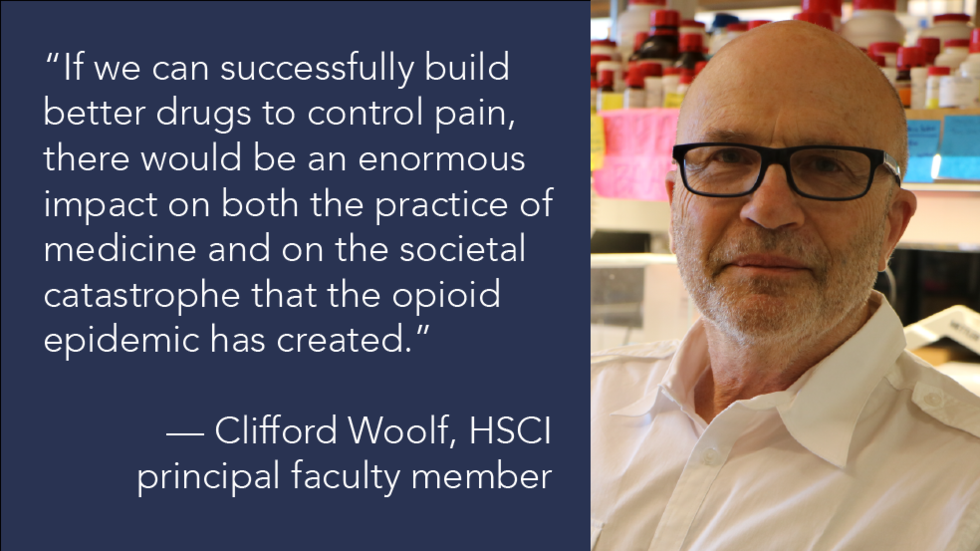HSCI faculty member co-leads Harvard Medical School project

As the opioid epidemic continues to devastate communities across the U.S., there is a critical public health need for new, safer and more effective medicines to treat pain. To address this need, the Safe Therapeutic Options for Pain and Inflammation (STOP PAIN) consortium has been launched by Harvard Medical School (HMS). STOP PAIN is co-led by HSCI principal faculty member Clifford Woolf, professor of neurology and of neurobiology at HMS and director of the F.M. Kirby Center and Program in Neurobiology at Boston Children’s Hospital.
The goal is to identify compounds that selectively block the activity of nociceptors — the sensory neurons that sense and initiate pain — with the goal of developing new, preclinical drug candidates that offer an alternative to opioid-based medications. The consortium combines expertise across research disciplines, including neurobiology, systems pharmacology, stem cell biology, and computational and medicinal chemistry.
“If we can successfully build better drugs to control pain, such that no physician would ever need to prescribe opioids because there would be safer and more effective options available, there would be an enormous impact on both the practice of medicine and on the societal catastrophe that the opioid epidemic has created,” Woolf said. “As a consortium, we are keen to accept this challenge and to do everything possible to achieve this goal.”
STOP PAIN is co-led by Peter Sorger, the Otto Krayer Professor of Systems Pharmacology, and Bruce Bean, the Robert Winthrop Professor of Neurobiology. It brings together researchers from HMS and Boston Children’s Hospital, with collaborators from Massachusetts Institute of Technology and the Max Planck Institute for Medical Research in Germany. STOP PAIN is supported by the U.S. Defense Advanced Research Projects Agency (DARPA) through the Panacea program, which aims to engender new therapies that address under-met medical needs of active duty soldiers and veterans.
Unresolved crisis
According to the National Institute on Drug Abuse, more than 47,000 died as a result of opioid overdose in 2017, leading government agencies to declare a nationwide public health emergency.
Prescription opioids are only partially or not at all effective for chronic pain, and their prolonged use carries serious risks for developing tolerance, addiction and misuse. However, they remain a primary therapeutic option for the management of both acute and chronic pain, as efforts to develop nonopioid pain therapies have been largely unsuccessful.
Embracing complexity
To identify new, nonopioid drug candidates, the STOP PAIN consortium is taking a unique approach that embraces the complexity of the biology of pain.
Current drug development processes typically focus on screening for compounds that affect a single biological target. For example, people who have a congenital disorder that renders them insensitive to pain were found to have a defect in the protein Nav1.7 — but efforts to develop drugs that target Nav1.7 have failed.
Rather than beginning with predetermined targets, STOP PAIN consortium members will instead focus on the activity of cells, specifically the nociceptor neurons responsible for initiating the sensation of pain.
“This project is based on the recognition that many of the most effective drugs for other neurological diseases have many molecular targets, not just one,” Bean said. “Our goal is to systematically understand the complex network of molecules controlling the function of pain-sensing neurons and use that knowledge to design drug molecules that hit many targets, with the aim of safely and selectively inhibiting nociceptor function.”
Finding the silencers
The team will screen for small molecule, nonopioid-based compounds that silence the activity of stem-cell derived human nociceptors under laboratory conditions.
The team will focus on compounds that exclusively block nociceptor function, while leaving the activity of other cell types, such as motor neurons or heart cells, unaffected. This selective targeting is a key preclinical marker of safety and specificity. These compounds then will be comprehensively analyzed for their molecular and biological characteristics, including effects on gene expression, protein production and cell physiology.
These data will be combined with insights drawn from INDRA (Integrated Network and Dynamical Reasoning Assembler), a powerful artificial intelligence system developed at the Laboratory of Systems Pharmacology at HMS, which automatically parses the scientific literature and public databases to construct models of gene and protein networks that can then be tested in the lab.
Together, these analyses aim to articulate the precise molecular mechanisms by which compounds inhibit nociceptor function and reveal the specific molecular targets involved in order to inform further drug development.
Once fully characterized, promising compounds will be refined or redesigned through computational and experimental chemistry techniques to maximize their potential efficacy.
The compounds will then be tested for safety and efficacy for pain management in preclinical models and through new machine vision and learning tools developed by the consortium.
Future foundation
By integrating these complementary approaches, the STOP PAIN consortium intends to generate thoroughly evaluated drug candidates for submission to the FDA for Investigational New Drug designation.
The team believes that the shift from a target-based approach to a cell-based screening approach, backed up by sophisticated computational modeling, could help transform the process of drug discovery and validation by offering an alternative model to address other critical unmet therapeutic needs.
Drug development is notoriously slow and arduous, but the researchers say they are optimistic that the depth and breadth of their collective expertise — drawn from multiple disciplines and institutions — makes it possible to develop drug candidates suitable for human clinical trials within the five-year time frame of the project.
As one measure of progress, new compounds are already being synthesized and tested by the team.
“The development of safer medications to replace prescription opioids for pain management remains one of the most pressing unmet needs in medicine,” said George Q. Daley, dean of HMS and HSCI principal faculty member. “This ambitious multi-institutional consortium offers promise for improving the health and well-being of countless patients and families.”
Read more
This story was adapted from “Stopping Pain,” published on the HMS news website on December 2, 2019.
Related story: Reinventing Pain Killers
